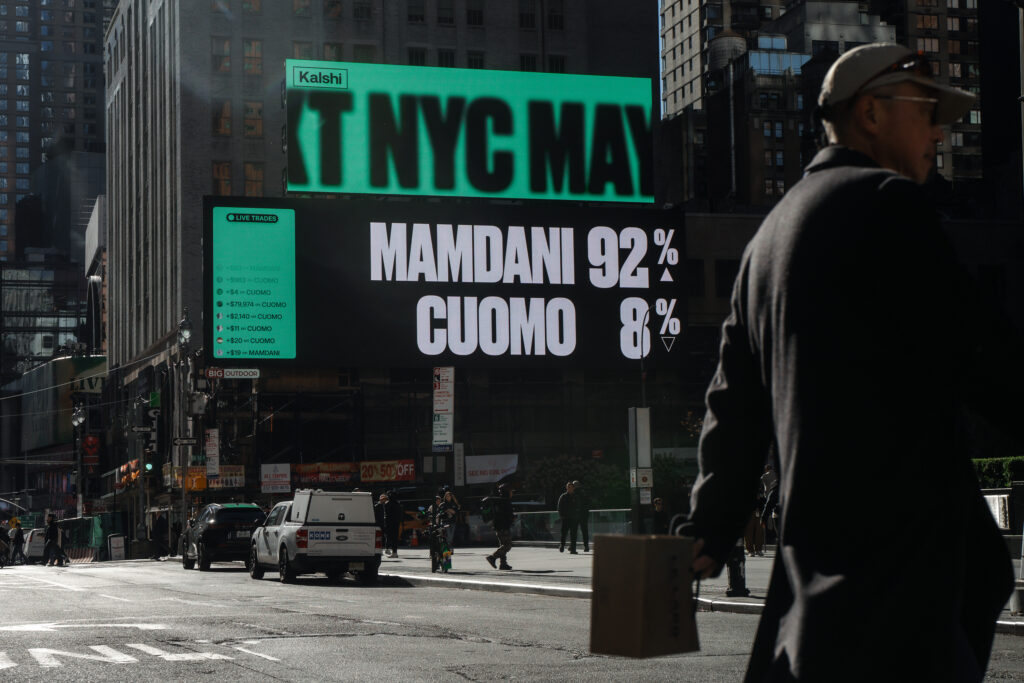Two of the biggest names in sports gambling, DraftKings and FanDuel, left the American Gaming Association, the powerful trade group representing the casino and gaming industry. The split underscores a widening rift over the fast-growing world of prediction markets, a form of real-money trading that blurs the line between gambling and financial speculation.
Prediction markets, operated by platforms such as Kalshi and Polymarket, allow users to trade “event contracts” on outcomes such as elections, weather, pop culture and, increasingly, sports. Though these markets are federally regulated through the Commodity Futures Trading Commission, they operate largely outside traditional state-by-state gambling frameworks.
The AGA, whose members include casinos, sportsbooks and tribal groups, has opposed prediction markets entering the sports space, arguing they threaten the integrity and regulation of sports betting. But DraftKings and FanDuel see them as an opportunity, especially in states such as Texas and California, where sports betting remains illegal.
“In discussion with DraftKings and FanDuel, the AGA has accepted their request to relinquish their membership, effective immediately,” the organization said in a statement.
Both of the popular gambling operators plan to launch new prediction platforms this winter, marking the start of what could be the next frontier in American sports. In a call with investors last week, DraftKings CEO Jason Robins noted that nearly half the country doesn’t have access to legalized sports betting and said the prediction markets represent “a significant incremental opportunity.”
What are prediction markets?
Prediction markets allow people to trade “event contracts,” essentially bets on the outcome of future events. Participants can buy or sell contracts tied to a question — “Will the Dallas Cowboys win Sunday’s game?” — with prices fluctuating between $0.01 and $0.99 depending on how likely traders think an outcome is. When the event settles, winning contracts pay out $1.
They are regulated federally as commodities under the CFTC rather than through state gambling commissions, meaning they can operate in states where sports betting remains illegal — and they can avoid state taxes and also state regulation.
DraftKings recently acquired Railbird Technologies, a federally licensed exchange regulated by the CFTC, and is preparing to launch a new app called DraftKings Predictions that will offer event contracts. FanDuel, meanwhile, partnered with CME Group and is launching an app called FanDuel Predicts in December.
The legality and the future of prediction markets is far from settled. There are several legal challenges pending, and ultimately the courts could decide whether prediction markets constitute sports betting and should be regulated as such.
What is the American Gaming Association?
The AGA is the casino industry’s main lobbying group, representing commercial and tribal casinos, gaming manufacturers and online operators. It advocates for legal, regulated gambling and works closely with state and federal policymakers to maintain industry standards.
What is the relationship between the AGA and DraftKings and FanDuel?
It has always been a little complicated.
When DraftKings and FanDuel emerged as daily fantasy sports operators more than a decade ago, many AGA members — particularly brick-and-mortar casinos — viewed them as competition that was skirting gambling laws. Neither company was part of the AGA in those early years.
They joined the association in 2018 as both pivoted into licensed sports betting operators, aligning with the AGA’s efforts to expand and legitimize online wagering nationwide. FanDuel and DraftKings collaborated with the AGA on research and education efforts, but much of their state-level lobbying efforts have been handled through a separate coalition — the Sports Betting Alliance.
Why did DraftKings and FanDuel leave the AGA?
Both companies said their strategic direction and planned products no longer align with the AGA’s stringent stance.
“As the company’s business strategy evolves — including with prediction markets — DraftKings determined that its plans no longer fully align with the AGA’s direction in certain areas and have decided to relinquish its membership,” a DraftKings spokesperson said in a statement.
“FanDuel has built our business by maintaining strong industry partnerships,” the company said in its own statement. “But as we expand into prediction markets, we recognize this direction is not aligned with the American Gaming Association’s current priorities. After thoughtful consideration, we have decided to step back from our AGA membership at this time. FanDuel has always been the company that moves quickly, from daily fantasy to mobile sports betting to prediction markets.”
Why did DraftKings and FanDuel change positions?
DraftKings and FanDuel are placing a strategic bet on the shifting landscape. Each was slow to enter the prediction market space, patiently waiting to see what federal oversight and involvement might look like. In September, the CFTC announced it had “taken a no-action position” on Polymarket, essentially giving the prediction markets a green light to continue operations.
Several states have resisted legalizing sports gambling, and the prediction markets represent the best way for DraftKings and FanDuel to reach these customers. Within weeks of the CFTC announcement, both companies had lined up strategic partners and made plans to launch prediction market apps by the end of the year.
Why is the AGA holding strong?
The AGA was founded by traditional, legacy gambling operators, largely brick-and-mortar casinos. Its mission is to protect those members’ interests, and the AGA feels the prediction markets represent a financial threat. The AGA says those operators bypass the regulation and licensing process that sportsbooks must endure and openly flout sports betting’s state and tribal oversight and skirt state laws.
The group has said these platforms “disregard vital consumer protections, generate no benefits for local communities, and threaten the integrity of games.”
According to AGA estimates, states already have lost more than $142 million in tax revenue since prediction markets began offering sports contracts.
What does all of this mean going forward?
The AGA will continue without two prominent, deep-pocketed members, and DraftKings and FanDuel will enter the prediction market space as soon as possible. Sports fans in states that currently ban sports gambling should expect to have a legal avenue to effectively wager on sporting events by the end of the year. People who live in states that currently offer legalized sports betting might not see much difference. FanDuel and DraftKings will still offer event contracts in these places through their new apps, but they say they won’t include sports options, preferring clients continue to use their regulated sports betting apps.
The post DraftKings, FanDuel split with gambling lobby, embrace prediction markets
appeared first on Washington Post.




